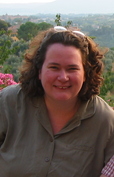Describe your writing process. Where does a poem begin for you? How do you know when it's done?
My writing process begins, if I’m lucky, with a walk. I use that time to try and find an image of the day (my former teacher Jon Woodward taught me to write an image of the day) and then after that, try and write in my journal for at least fifteen minutes a day. With a new job, I haven’t been making that time, but it’s a good goal.
Who has influenced your work? What inspires you to write?
Sylvia Plath was the first poet who blew my socks off. Now I try and read a lot of chapbooks. Also, I have read a lot of biographies of poets—Frank O’Hara and Anne Sexton and Elizabeth Bishop. Those can be amazing sources of inspiration to read how they dealt with the writing of poetry and just living day to day.
Why poetry and not prose? Or do you write both?
Why poetry? Good question. I think most poets have probably written in many different genres (although I have never attempted the novel), but some just feel more at home. I enjoy writing critical essays about poetry….but poetry when I’m writing it and it’s working, well….I get to create something like a snowflake. Small, intricate (hopefully), and able to spin in a myriad of directions.
How long have you been writing?
I actually have not been writing that long. But I have been a reader for a very long time…a serious reader. Tolkien got me through 7th and 8th grade. Reading was my escape. When I was in college, I finally got good grades—and in writing. It was my first clue.
For you, what's the most important part of a poem?
To me sound is really important. My sisters and I are all very hyper-sensitive to people who make chewing sounds….We have been known to walk out of The Nutcracker due to gum-chewing. We’d really punch each other if we were chewing food loudly…and our father used to make us sit at the dinner table for twenty minutes. His jaw clicked while he ate (an attribute I’ve since acquired) and we were nearly on the ceiling by the time dinner was done. So I’m very aware of the sounds of words and how they fit in the mouth.
Have you encountered resources or books on the craft of writing poems that have been especially valuable to you?
I love Steve Koweit’s In the Palm of Your Hand, and Kim Addonizio's Ordinary Genius.
Besides writing, what other interests do you pursue?
I’m a birdwatcher…so while I walk, I take notice of the birds I see. I live in New England, and to watch bluebirds hanging around in the conservation area where I walk is always a gift. The other day I had to stop for a dozen turkey trying to cross the street and seeing a pheasant run across my driveway when I first moved here was enormously pleasurably. I’ve had pilated woodpeckers thunk at my trees and the redness of cardinals grace some pretty gray days.
My website can be found here: http://carolbergpoetry.com/wordpress/

 RSS Feed
RSS Feed